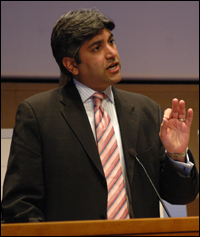 Note from the editor: This is a guest post from Aneesh Chopra, United States Chief Technology Officer.
Note from the editor: This is a guest post from Aneesh Chopra, United States Chief Technology Officer.
During last week’s State of the Union address, President Obama challenged the Nation to out-educate, out-innovate, and out-build our competition to win the future.
A critical ingredient in this endeavor is the creative spirit of the American entrepreneur that featured prominently in the President’s Strategy for American Innovation – a framework for long-term economic growth and sustainable job creation.
Today, President Obama celebrated the launch of Startup America, a national (public/private) campaign to celebrate, inspire, and accelerate high-growth entrepreneurship across all corners of the country, and the formation of the Startup America Partnership to catalyze private support for entrepreneurial ecosystems.
Steve Case, co-founder of AOL and Chairman of the Case Foundation, will chair the Partnership, and Carl Schramm, President and CEO of the Kauffman Foundation will be a founding board member.
This endeavor will tap into the expertise of the country’s most innovative entrepreneurs, corporations, universities, foundations, and other leaders and institutions, working in concert with a wide range of Federal agencies to dramatically increase the prevalence and success of America’s entrepreneurs.
To kick-start the campaign, the Obama Administration announced 27 public and private commitments organized across five key goals:
1. Expand access to capital for high-growth startups.
The Small Business Administration (SBA) will commit $2 billion as a match to private sector investment over the next five years in promising high-growth companies. Using existing authority, with no new cost to taxpayers, and through the operating infrastructure of the Small Business Investment Company (SBIC) program, SBA-guaranteed bonds will match private capital raised by these privately-owned and managed investment funds and will focus on growth companies in underserved communities and those in the so-called “valley of death” in the innovation lifecycle.
In March, Secretary Geithner will convene a summit on access to capital for small and entrepreneurial businesses with participation from entrepreneurs, investors, and policy makers.
Stay tuned.
2. Expand entrepreneurship education and mentorship programs.
The indefatigable Brad Feld and his TechStars colleagues will scale the mentorship-driven startup accelerator model to 15 independently owned and operated regional organizations. Over the next three years, the TechStars Network will ensure that 5,000 successful and experienced entrepreneurs and investors will mentor and support 6,000 promising young entrepreneurs, increasing their success rate tenfold and creating 25,000 new jobs by 2015.
Several organizations, public and private, will focus on boosting the number of entrepreneurs among our nation’s veterans, women, and students. The Department of Veterans Affairs (VA) will establish two integrated business accelerators – one web-based and the other physically located in Waukesha, WI. A coalition of foundation and corporate partners will enable Astia to inspire a new generation of women entrepreneurs.
And the National Foundation for Teaching Entrepreneurship, recent guests at the White House, will scale its highly successful educational programs targeting at-risk high school students both physically (new communities and projects) and virtually (better online resources).
3. Strengthen federally-funded R&D commercialization.
The Deshpande Foundation will join with The Idea Village and Tulane University to enhance the innovation ecosystem of New Orleans. Learning from its successful programs at MIT and the recently launched “innovation sandbox” in the Merrimack Valley, where I had the pleasure of visiting, this endeavor will foster large-scale entrepreneurship, building on the skills and talents of the local community, including local business, higher education, and non-profits.
Our Nation’s research agencies are actively engaged on this topic. Building on the success of last year’s inaugural i6 Challenge, the Economic Development Administration will launch the $12M i6 Green Challenge in collaboration with research agencies focused on proof-of-concept centers that accelerate technology commercialization, regional economic development, and environmental sustainability.
4. Identify and remove unnecessary barriers to high-growth startups.
My colleague in the Office of Management and Budget, Cass Sunstein, is leading the President’s regulatory review initiative. An important component is the ability to take into consideration the impact of rule-making on small businesses and offer flexibility when appropriate.
To hear from entrepreneurs directly, the Administration will launch online suggestion tools and visit innovation centers like Silicon Valley and North Carolina’s Research Triangle Park to identify suggestions on how to streamline or eliminate the biggest barriers to startup growth. Please drop by our panel at South by Southwest in Austin, TX and stay tuned for a visit to a city near you.
The Department of Health and Human Services will scale a more targeted effort, “DC-to-VC,” to engage venture capitalists, innovators, and entrepreneurs who are increasingly focused on how to capitalize on reforms that promote health IT adoption, reform payment incentives to reward value, not volume, and liberate an unprecedented amount of health information. Renowned healthcare venture capitalist Bryan Roberts, of Venrock, recently commented on this opportunity as did a number of investors at the recent JP Morgan healthcare conference.
5. Expand collaborations between large companies and startups.
Last year, Intel launched the Invest in America Alliance to bring together companies to expand investment in American startups. This year, to advance the goals of Startup America, Intel Capital will commit $200M of new investment in U.S. companies.
IBM will invest $150 million in 2011 to fund programs that promote entrepreneurs and new business opportunities in the United States.
And fresh from his performance on Saturday Night Live, Mark Zuckerberg and his six-year old startup, Facebook, will launch Startup Days, a new series of 12 to 15 events around the country designed to provide entrepreneurs with access to expertise, resources, and engineers to help accelerate their businesses.
This is just the beginning. President Obama has challenged us with a bold vision to grow our economy through innovation and entrepreneurship. Thanks to today’s public/private collaboration, we are better organized to give every American a chance to win the future.